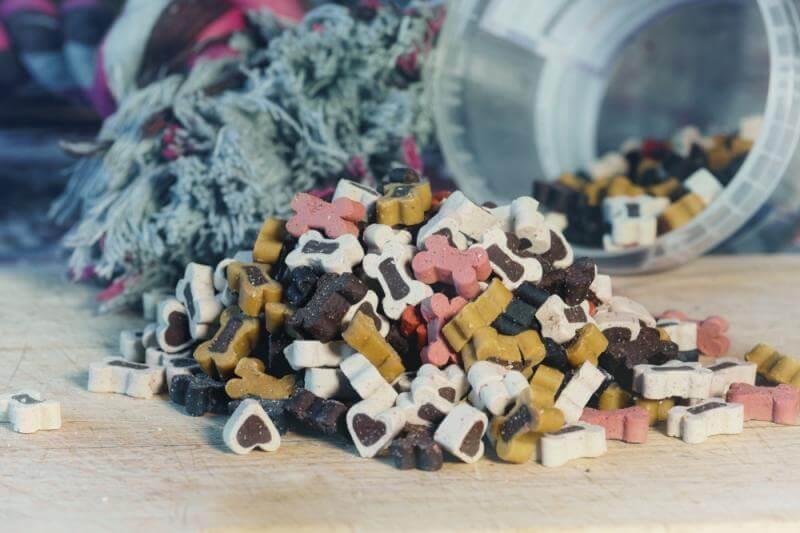
When it comes to nutrition, there's a lot of misleading information out there — that's why it's more important than ever that you have the facts you need to make informed decisions about your dog's health.
At Plymouth Veterinary Hospital, we support you in making the best nutritional decisions for your dog. We offer a wide array of prescription diets to help your dog if they are having health issues, we can also recommend diets that are best suited for your dog’s needs.
Can too much protein be bad for my Dog?
While many pet parents have their pet's best interest at heart when they feed excessive protein foods, the scientific truth about protein is a little more complicated. Science tells us that when it comes to protein, there is such a thing as too much of a good thing — even for animals.
More protein doesn't mean more muscle. When consumed more than a pet's daily requirement (yes, they have daily requirements), it may harm their liver, kidneys, and gut microbiome. It's impossible to measure a dog's inherent desire for meat, but when given a choice, research shows pets choose higher fat foods, not higher protein.
Your pet's body can only do two things with too much protein:
- Turn it into waste
- Store it as fat
That's why Hill's Pet Food Company (one of the dog diets that we highly recommend!) believes both the quality and quantity of protein are equally crucial for the optimal nutrition of your pet. And it's why we make sure that every food has the right amount of protein your pet needs — along with carbs, fiber, amino acids, vitamins, and other minerals to support their overall health.
So, how is a high-quality protein used in the body?
- It is easily digestible and used in muscle building
- It brings high levels of all essential amino acids, the building blocks of body proteins
- It doesn't carry an excess of minerals or other nutrients
Is Raw Food Safe for my Dog?
When you look at your pet's sharp teeth, raw food can seem like a logical answer for their dietary needs — just like wolves, right? But your Dog is not a wolf, and what we know from science is that raw food does not offer a demonstrated nutritional advantage of overcooked foods. Whether that chicken is cooked or raw, your pet's body will respond to it the same — however, raw meat is not always perfectly safe.
The fact of the matter is, your pets are no more protected from salmonella and other foodborne illnesses than a baby, a child, or even you. Because of this, feeding raw pet foods or BARF (bones and raw foods — biologically inappropriate for your pet) is not supported by any current biological science and not recommended.
Here are a few things well-meaning pet owners often don't consider when they feed their pets raw foods:
- Your pet does not have an iron stomach, contrary to myths
- Pets often lick things — children, furniture and more — which can spread bacteria
- It's impossible to measure a dog's instinctive desire for meat, but when given a choice, research shows pets choose higher fat foods, not higher protein
Research shows us that feeding raw food provides little to no documented benefits over cooked meat — yet comes with significant health risks for you and your family, including your pet.
We believe it's not worth the risk when other pet food options are available. Beyond that, dogs are omnivores with great flexibility in the types of food they can and should eat for their optimal nutrition.
So why should you choose pet products that we recommend over raw foods for your pets?
- The foods that we recommend your dog the balanced nutrition they need, including carbohydrates, fiber, vitamins, minerals, and amino acids
- They supported by decades of data and research into your pet's biological make-up and needs
- It means your dog get the benefit of food produced with stringent testing and safety standards
Give us a call or make an appointment to discuss your dog’s nutritional needs. We are here to help you make the best decision possible for your dog.
References
- Weese JS, Rousseau J, Arroyo L. Bacteriological evaluation of commercial canine and feline raw diets. The Canadian Veterinary Journal. 2005;46(6):513-516.
- Weese JS, Rousseau J. Survival of Salmonella Copenhagen in food bowls following contamination with experimentally inoculated raw meat: Effects of time, cleaning, and disinfection. The Canadian Veterinary Journal. 2006;47(9):887-889.
- Schlesinger DP, Joffe DJ. Raw food diets in companion animals: A critical review. The Canadian Veterinary Journal. 2011;52(1):50-54.
- Credit: Hill's Pet Nutrition Website, 2020
